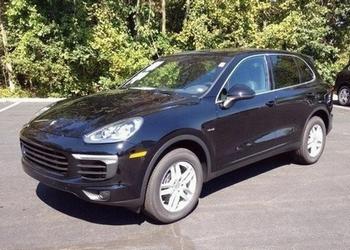
SACRAMENTO, California, May 18, 2017 (ENS) – Volkswagen will pay US$225 million, including $66 million to California, for harm resulting from the sale of its 3.0-liter diesel passenger cars that included emissions control “defeat devices,” under partial consent decrees signed Wednesday.
These consent decrees are distinct from one approved earlier for harm from VW’s 2.0-liter diesel cars with a similar defeat device.
U.S. District Court Judge Charles Breyer signed the agreements between the automaker, the California Air Resources Board (CARB), the U.S. Environmental Protection Agency and the U.S. Department of Justice.

One decree is a national agreement; the second is California-specific. California will receive $41 million from the national agreement and $25 million under the California agreement.
“These agreements close another chapter in one of the most sordid efforts to evade air quality regulations ever uncovered by CARB’s engineers and technicians,” said Richard Corey, executive officer of the California Air Resources Board. “It is now time to get on with the serious business of mitigating the environmental harm caused in this case, and continue our efforts to make sure nothing like this occurs again.”
VW admitted to CARB engineers in November 2015 that it installed “defeat devices” that altered the operation of emissions control equipment in light-duty, 3.0-liter passenger vehicles manufactured and sold between model years 2009 and 2016.
There are about 87,000 of these vehicles in the United States and some 17,000 in California.
California will receive about $41 million from the national mitigation trust for the environmental damage caused by VW’s deception.
This money will be spent on projects to reduce smog-producing pollution, such as incentivizing clean, heavy-duty vehicles and equipment in disadvantaged communities.
In a separate California decree, an additional $25 million dollars will be invested to advance availability of cleaner vehicles in California’s disadvantaged communities.
The two sums together will provide funding to mitigate all past and future environmental harm resulting from the operation of the 3.0-liter vehicles in California.
The state will undertake a public process to allow members of the California Legislature and the public to provide input and comments on potential mitigation projects to be funded by the settlement.
VW also agrees to place a second Green City project in California. This could include such features as zero-emission vehicle (ZEV) ridesharing projects or ZEV transit and freight applications.
The selected city must have a population of about 500,000 and consist primarily of disadvantaged communities. A first Green City was called for in the Consent Decree for the 2.0 liter vehicles. No city has yet been named.
In addition, VW will contribute to California’s ZEV market by introducing two new ZEV models, plus the electric e-Golf, or its replacement, by 2019.
One of those new vehicles must be an electric SUV. The company will also introduce a second SUV by 2020. It must collectively sell at least 35,000 of these various ZEV models between 2019 and 2025.
Following publication of a report indicating high emissions from Volkswagen vehicles in over-the-road testing, CARB conducted a focused investigation which ultimately led to Volkswagen’s admission in September 2015 that the company had installed defeat devices in all of its 2.0 liter diesel vehicles manufactured between model years 2009 and 2015.
This was followed in November 2015 by an admission by Audi engineers that 3.0 liter diesel passenger cars manufactured by VW, Audi and Porsche in model years 2009-2016 also contain defeat devices. VW owns all three manufacturers.
Affected 3.0 diesel models include:
• 2009 VW Touareg, Audi Q7
• 2010 VW Touareg, Audi Q7
• 20011 VW Touareg, Audi Q7
• 2012 VW Touareg, Audi Q7
• 2013 VW Touareg, Audi Q7, Porsche Cayenne Diesel
• 2014 VW Touareg, Audi Q7, Porsche Cayenne Diesel
• 2014 Audi A6, A7, A8, A8L, Q5
• 2015 Audi Q7, A6, A7, A8, A8L, Q5
• 2015 VW Touareg, Porsche Cayenne Diesel
• 2016 VW Touareg, Porsche Cayenne Diesel, Audi A6, A7, A8, A8L, Q5
Because CARB’s technical staff played a chief role in revealing VW’s deceit, and due to CARB’s longstanding role in setting and enforcing tough vehicle standards, California played a major role in leading, shaping and structuring the consent decrees.
In California, VW’s cheating was particularly harmful, because the state’s air quality is worse than anywhere else in the nation.
Ten million people live within the nation’s only severe nonattainment areas for ozone pollution, of which nitrogen oxide, or NOx, is a primary component. Twelve million Californians live in areas with nation-leading levels of fine particle pollution.
These pollutants cause lung disease, heart disease, and premature death, especially among the most vulnerable populations.
To put California on track to ensure healthy air for all, California has adopted the most stringent air quality regulatory and enforcement program in the United States.
As a result of the 2.0 liter and 3.0 liter Consent Decrees, California is expected to be allocated a total of about $423 million from an Environmental Mitigation Trust, explained in the first Consent Decree.
That money is to mitigate the lifetime excess NOx emissions of the VW vehicles with the defeat device. Under the terms of the consent decree VW must invest $800 million for zero-emission vehicle projects in California over a 10-year period.
The approved 3.0 liter partial consent decrees are here: https://www.arb.ca.gov/msprog/vw_info/vw-diesel-info/2017-05-17-2nd-partial-cd-30l.pdf
Copyright Environment News Service (ENS) 2017. All rights reserved.
© 2017, Environment News Service. All rights reserved. Content may be quoted only with proper attribution and a direct link to the original article. Full reproduction is prohibited.
